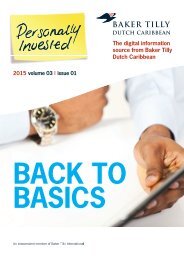Baker Tilly Dutch Caribbean | Edition 1 2014
The digital information source from Baker Tilly Dutch Caribbean.
The digital information source from Baker Tilly Dutch Caribbean.
Create successful ePaper yourself
Turn your PDF publications into a flip-book with our unique Google optimized e-Paper software.
PENALTIES IN<br />
TAX LAW<br />
Incorrect tax returns? You could<br />
face incarceration.<br />
Curaçao and St. Maarten’s Tax Legislations have a special<br />
chapter on penalties in case of violations of tax laws. If a<br />
taxpayer evades tax regulations, he risks punishment under<br />
either administrative (tax) law or criminal (tax) law.<br />
In case of criminal (tax) law, only<br />
a criminal Court may impose a<br />
penalty. This penalty may vary<br />
from a fine to imprisonment or a<br />
combination of the two. In general,<br />
criminal prosecution only takes<br />
place if the taxpayer deliberately<br />
and/or regularly did not file tax<br />
returns and/or evades paying large<br />
amounts of taxes.<br />
In most cases, a taxpayer<br />
is punished on the basis of<br />
administrative (tax) law.<br />
The fines under this law can be<br />
divided in ‘offence fines’ (in <strong>Dutch</strong><br />
“vergrijpboetes”) or ‘default fines’<br />
(in <strong>Dutch</strong> “verzuimboetes”). Certain<br />
officers of the Tax Authorities or<br />
judges of aTax Court may impose<br />
these fines.<br />
An offence fine will be imposed in<br />
case of more serious tax offences.<br />
This fine may run up to 100% of<br />
the tax not paid. The amount of a<br />
default fine depends on specific<br />
conditions such as the number of<br />
prior defaults.<br />
pag 8 pag 9






